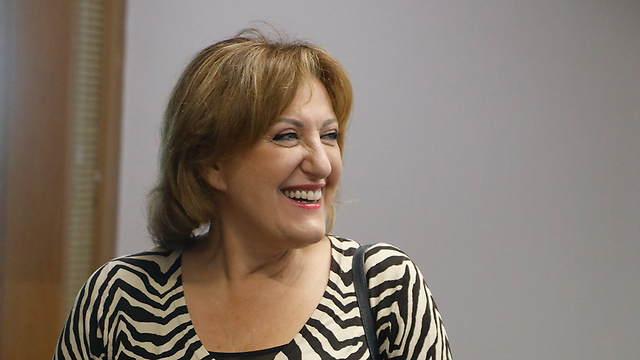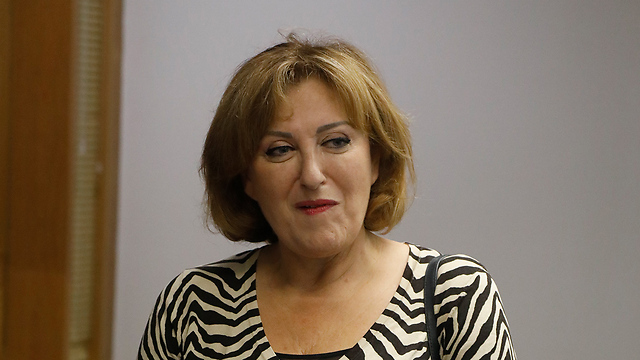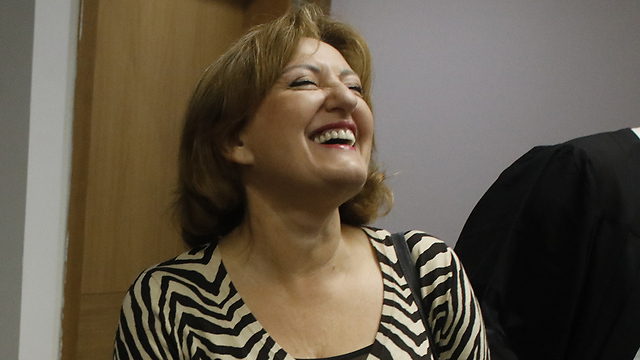
Kirschenbaum inn court
צילום: שאול גולן
Kirschenbaum pleads not guilty in corruption affair
Former deputy minister Faina Kirschenbaum, who is facing a series of corruption charges as part of the Yisrael Beytenu affair, answers to some of the accusations leveled against her.
Former deputy minister Faina Kirschenbaum, who is facing a series of corruption charges, pled not guilty at the Tel Aviv District Court on Wednesday.
Kirschenbaum, a former senior member of Defense Minister Avigdor Lieberman's Yisrael Beytenu, was indicted for multiple counts of bribery, fraud and breach of trust, money laundering and tax offenses.
At court, Kirschenbaum answered several of the accusations leveled against her.
One case concerns Nelly Dinovizky, the owner of a production company, who allegedly asked her friend Kirschenbaum and former Yisrael Beytenu chief of staff David (Daud) Godovsky to help her find work, using their connections in local municipalities to do so.
Dinovizky's company received state funding for 19 events, at a total of NIS 1.3 million, with Kirschenbaum and Godovsky allegedly pocketing 10 percent of the budget of each event—a total of NIS 155,000.
Kirschenbaum also allegedly tried to help Dinovizky produce events in Moldova and Ukraine with a budget of NIS 12 million. According to the indictment, Kirschenbaum organized a meeting between Dinovizky and then-tourism minister Stas Misezhnikov, who was convicted in connection with the corruption affair and sentenced to 15 months in prison. The project fell through because of objections from Tourism Ministry officials.
Kirschenbaum claimed on Wednesday that she did not receive any money from Dinovizky and did not split the profits of Dinovizky's productions. The former deputy minister also claimed Dinovizky owed her NIS 20,000, given as a personal loan.
In another case, Kirschenbaum was asked to help secure state funding for different municipalities and organizations, including the Samaria Regional Council, the Megilot Regional Council, the Ezra Movement, the Ayalim Association and private individuals promoting public activity. She agreed to provide the needed funding, and in return Kirschenbaum and Godovsky demanded bribes in the form of a significant portion of the funds received.
Kirschenbaum denied on Wednesday that she had asked former Samaria Regional Council head Gershon Mesika for a NIS 1.5 million commission in return for NIS 3.5 million in coalition funds to pay off debts of the Central Company for the Development of Samaria.
Mesika, who became a state witness in the case in March 2015, testified that the NIS 1.5 million were given in services to the Yisrael Beytenu Party, including transportation services.
Kirschenbaum, meanwhile, claimed Wednesday she stopped working with the regional council's transportation company as soon as she learned of the steep prices they were charging.
Answering allegations she received kickbacks from the Ezra Movement in the form of trips abroad, Kirschenbaum said the trips were work related to promoted shared goals of Yisrael Beytenu and the Ezra Movement, which is also active abroad.
She also responded to allegations the Ezra Movement funded trips abroad for her family in 2013, saying her family members would often accompany her on trips to raise money for Ezra. For other trips, she explained, her family members joined her because she was combining a work trip with a private family vacation.
Concerning the Ayalim Association, Kirschenbaum claimed Yisrael Beytenu transferred money to the association for a joint project meant to prevent young people from emigrating out of Israel.
Kirschenbaum was also asked to explain funds given by Yisrael Beytenu to the Israel Basketball Association and the Israel Handball Association, even though the two are not eligible for support from coalition funds.
In return for NIS 1 million to the Basketball Association, Rami Cohen, the former director-general of the Agriculture Ministry and a business consultant with ties to Yisrael Beytenu, allegedly received kickbacks in the form of NIS 98,000 from the allocated funds. Kirschenbaum allegedly held a meeting with Cohen and Moshe Kalisky, then a member of the Basketball Association, to discuss the funding.
In her response at court, Kirschenbaum claimed Yisrael Beytenu transferred funds to the Basketball Association as part of its goal to promote sports in Israel.
According to the indictment, from 2006 and until the launch of the police's open investigation against her in December 2014, Kirschenbaum has acted in a planned and systematic manner—at times even sophisticated—to commit a series of offenses.
She allegedly took advantage of her position and status as a public servant, and particularly her control of the party's coalition money, to demand and receive bribes from public institutions, organizations and private individuals. These bribes were given in the form of illicit benefits to her and her family, the Yisrael Beytenu party and close associates of hers or the party's.
Often, Kirschenbaum also asked, urged or demanded other public servants, heads of state institutions, heads of NGOs and private individuals to help her to carry out her criminal actions and then cover it up.













